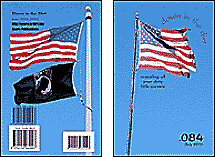



 This writing was accepted for publication
This writing was accepted for publicationin the 84 page perfect-bound issue of Down in the Dirt magazine To order this, click on the link below: 
|
|
Order this writing in the 2010 collection book of July-December prose from “Down in the Dirt”:  |
 |
click on the book cover for an author & poem listing, order the 5.5" x 8.5" ISSN# book order the 6" x 9" ISBN# book |
| ||
![]()




